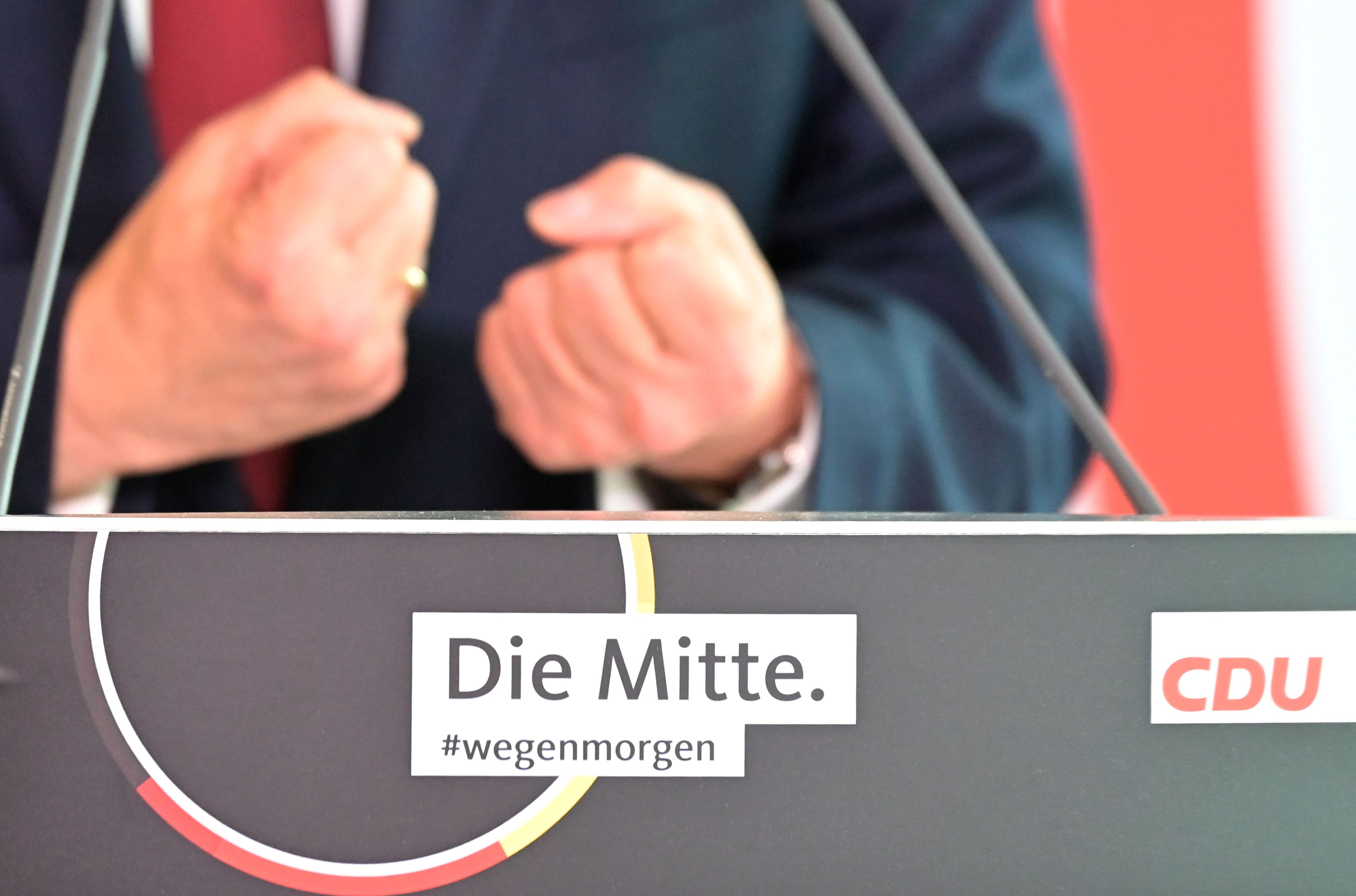The Favourites: Merz Puts German Christian Democrats on Track for Key 2025 Elections
The Christian Democratic Union (CDU) is the favourite to win the fast-track Bundestag elections, which are expected to be held on 23 February 2025. The election campaign will be the culmination of the party’s ongoing identity and programmatic transformation since losing power in 2021, particularly its shift away from former Chancellor Angela Merkel’s worldview and legacy on migration issues. In foreign and security policy, the programmatic foundation will remain cooperation with allies within NATO and the EU, as well as the desire to maintain good relations with the new U.S. administration.
.png) Liesa Johannssen / Reuters / Forum
Liesa Johannssen / Reuters / Forum
New CDU Leader and Programme
The German Christian Democrats have made a number of changes since losing power in 2021. In January 2022, Friedrich Merz became the party’s leader and the head of the parliamentary group. The politician had led the Christian Democrats’ club in the Bundestag in 2000-2002 but lost that position and influence in the party to Merkel. In 2009, he retired from politics and worked for the U.S. investment fund BlackRock, among others. From 2009 to 2019, he chaired the Atlantik-Brücke association working for the cause of transatlantic ties. Merz’s return to politics and a leadership role in the CDU was achieved by capitalising on activists’ disillusionment with the party after the defeat in the 2021 elections. Merz, a long-time rival and critic of Angela Merkel, presented himself at the time as a breakthrough-type of politician offering to return the party to its conservative roots.
The most important message of the CDU’s renewal is a new programme adopted at the party’s May congress. Its announcement was part of the preparations for a series of upcoming elections, ranging from those for the European Parliament last June, through September’s state elections, to next year’s Bundestag elections. Unlike the document under then Chancellor Merkel, the party’s latest programme emphasises the role of German culture as a guiding force in a multicultural society and the need to protect Christian values. It also calls for a sharp reduction in migration. These provisions match public sentiment and are an attempt to win over some supporters of far-right Alternative for Germany (AfD) and the far-left Sahra Wagenknecht Alliance (BSW).
In foreign policy and defence, recognition of NATO and Germany’s alliance with the US as a pillar of security and a commitment to the idea of European integration remain unchanged. Along these lines, the CDU leader supports the deployment of U.S. medium-range missiles to Germany as an element of deterring Russia, although implementation of the project remains uncertain after Donald Trump’s re-election as U.S. president.
In addition to programmatic changes, the CDU has focused on rebuilding and consolidating the party structures around Merz. In September, he was unanimously chosen by the leadership of the CDU and its “sister party” the Bavarian CSU as its candidate for Chancellor. This is a signal of the centre-right’s mobilisation for the upcoming elections and the strong position of its leader. This prevented a repeat of the 2021 scenario when the long rivalry between CDU and CSU leaders Armin Laschet and Markus Söder to become the candidate for Chancellor weakened their Bundestag campaign.
Merz advocates liberal economic solutions, low taxes, cutting bureaucracy, and support for business. He criticises the social programmes introduced by the SPD-Green and FDP coalition governments, especially the basic citizen’s allowance, and promises to cut them. He favours preserving the “debt brake” rule, but does not rule out reforming it if funds raised by increasing the debt will be used for investment.
Christian Democrats’ Electoral Chances and Vulnerabilities
The CDU’s likely victory in next year’s elections is indicated by favourable opinion poll ratings. The Christian Democrats have been leading in the polls since spring 2022, registering stable, high support. According to a survey taken after the collapse of the government coalition, the CDU can count on 33-34% of the vote. The ratings were confirmed by the party’s victory in the European Parliament elections.
Also working in favour of the centre-right are Germany’s stagnant economy and a political crisis caused by the breakup of the ruling coalition. These factors reinforce the CDU’s narrative that Chancellor Scholz is exercising poor leadership and his government is incompetent.
The problem for the Christian Democrats is the limited voter confidence in Merz himself. According to a Deutschland Trend survey for ARD television, 58% of respondents had a negative view of the politician’s record. Only one-third of those surveyed spoke positively of the CDU leader. These ratings, however, are higher than Chancellor Scholz’s job approval rating (20% positive). Support for Merz remains slightly lower than the CDU’s own score, which indicates both the limited ability of its leader to attract new voters and that he may be preventing further increases in support. Another hurdle is a lack of confidence in the effectiveness of the eventual government that would be formed by the CDU. In the ARD poll, only 23% of those surveyed felt that such a cabinet would handle the challenges better than Chancellor Scholz’s government. The limited trust in Merz stems from his image as a politician that looks out for the interests of better-off social groups and his tendency to make reckless statements—for example, in 2022 he stated that the purpose of refugees coming from Ukraine to Germany was “social tourism”. Another weakness is his lack of government experience, as he has never held ministerial positions at either the federal or state level.
Election Campaign
In addition to victory, the goal of the Christian Democrats’ campaign will be to avoid a scenario in which it will require a three-party coalition to establish a majority. For the CDU, the optimal, but unlikely scenario, in light of the polls, would be a coalition with the liberals from the FDP. The most likely option is a “grand” coalition with the Social Democrats, weakened after the elections and without Scholz and his closest associates. Less likely is a coalition with the Greens, due to opposition from the Bavarian CSU.
The main topics of the election campaign will be the country’s economic situation and migration. The CDU leader’s narrative on economic issues will be based on defending prosperity and supporting the middle class. The CDU leader will emphasise the necessity of helping business and preserving the competitiveness of the German economy, especially industry. The second pillar of the campaign will be limiting migration. The CDU backed a September decision to introduce controls at all of Germany’s borders, and ahead of the elections it can be expected to announce a complete end to asylum and disallowing migrants from crossing the border. On the EU’s external borders, the CDU proposes expanding and strengthening the powers of Frontex. Another element of the election campaign will be a more pragmatic approach to the energy transition, de facto slowing it down as it is too costly for the economy and citizens.
International affairs will not be a key element of the debate ahead of the elections, but with Trump’s victory, among other things, European security will be one of the important topics. The CDU will advocate continued support for Ukraine. Merz’s goal will also be to convince the public that, as Chancellor, he will be able to communicate with Trump. The CDU leader has alluded to the possibility of further purchases of U.S. arms and his intention to continue the Bundeswehr modernisation, which began in 2022, but without details on its financing. Merz has also so far not presented any plan for an accommodation with the new U.S. president.
In the European context, Merz points to the need to strengthen Germany’s position in the EU, arguing that it has been weakened by Chancellor Scholz’s policies. In this context, Merz also stresses the need for closer cooperation within the Weimar Triangle and the expansion of European defence capabilities and joint equipment purchases (which could benefit German arms companies). The CDU, however, rejects the idea of joint European defence debt. The alternative would be to finance projects through the European Investment Bank and possibly set aside funds in the EU’s 2028-2034 Multiannual Financial Framework.
Conclusions
The expected victory for the Christian Democrats will mean Germany upholding key tenets of its foreign policy regardless of the shape of the new coalition. Commitment to the idea of European integration and NATO and transatlantic ties also will remain unchanged. The CDU’s vague programme on both economic issues and its approach to the incoming Trump administration remains problematic. There is a risk that in the next Bundestag term that the CDU/CSU-SPD coalition will not be able to introduce far-reaching reforms, which in turn will strengthen extremist parties, especially the AfD.
From Poland’s point of view, the CDU leader’s accent on his willingness to cooperate both bilaterally and within the Weimar Triangle is beneficial. An area for discussion could be the protection of the EU’s external borders, both on land and via the Baltic Sea. The CDU leader’s views ruling out Germany’s agreement to joint debt in the EU to strengthen its defence capabilities may become a point of contention in bilateral relations. Further support for Ukraine and the formulation of firm messaging vis-à-vis Russia can be expected, but without a fundamental change in the existing course.




.png)
(1).jpg)